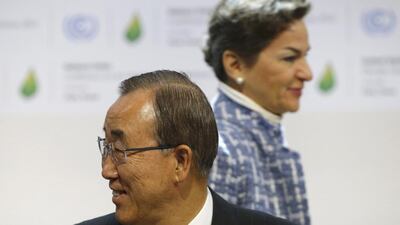PARIS // As UN secretary general Ban Ki-moon urged countries to reach an agreement on climate change at the 2015 Paris Climate Conference, the UAE delegation says an agreement will be beneficial for the Arabian Gulf.
Mr Ban on Monday said the opportunity of having a gathering of ministers from 150 countries to draft a text on tackling climate change was not likely to happen again.
“During my nine years as the secretary general I have never before have so many heads of state and government gathered in one place at one time with one common purpose. Leaders have assured me they will work to remove any roadblocks,” he said.
Dr Sultan Al Jaber, Minister of State, who had a meeting with Mr Ban on Monday, said the UAE was looking to address climate change by having a clear definition of how it will affect the country, the region and the planet. “What we have witnessed this time around in Paris is that this is the first time that all GCC countries have pledged to mitigate and tackle climate change as one bloc,” he said.
Dr Al Jaber said the GCC countries had come under one “umbrella and one definition – economic diversification”.
“We are now all under the belief that addressing climate change is, in fact, an opportunity,” he added. “To us in the GCC we look to Paris as a launch pad, not the finish line, Paris is where we will begin work.”
Mr Ban, however, said the national climate plans were a start, but the world was falling short in reducing global warming.
“We must go much further and much faster [in curbing climate change] and that is why we need action now here in Paris and we cannot afford half measures or delay. We have less than four days and some tough issues still remain,” he said.
Christiana Figueres, the executive secretary of the United Nations Framework Convention on Climate Change, said the fact that more than 180 countries had submitted action plans on reducing global warming signalled that the world community would reach an agreement.
Ms Figueres also addressed a major concern of Arabian Gulf states regarding fossil fuels.
“The agreement will point towards the process of decarbonising the energy sector,” she said. “Over time, not immediately, there will be an orderly transition and the ambition of the agreement will be judged on whether we can move towards that decarbonisation in time to stay below that two-degree window.”
The meeting in Paris aims to enact measures to reduce global warming to less than 2°C by 2050, but developing countries have insisted that it should not be at the expense of their economic growth.
Dr Al Jaber, however, said that the move away from fossil fuels was spurring economic development in the UAE.
“We have been able to turn it into a true economic opportunity,” he said. “Those who were sceptics or questioned the UAE’s or Abu Dhabi’s interest of pursuing renewable energy, even though it is a major oil producing nation, today they understand the answer.”
nalwasmi@thenational.ae

